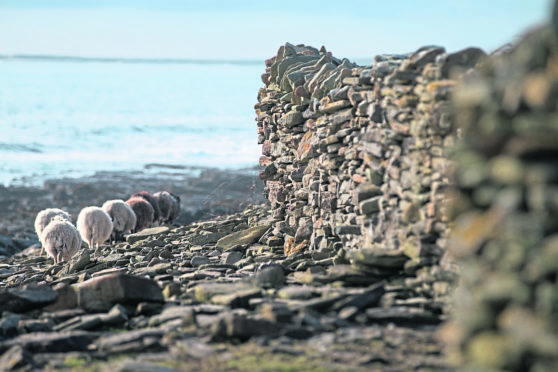Orkney’s most northerly island community is seeking applicants to look after a historic stone dyke that plays a vital part in the management of a unique local breed of ancient seaweed-eating sheep.
The 6ft high, 13-mile long dyke was erected in the 1800s using beach stones and encircles the entire island of North Ronaldsay, keeping the sheep on the rocky foreshore and separate from interior grassland.
North Ronaldsay mutton is exported from the island and much prized as a delicacy, thanks to its distinctive flavour. Wool from the sheep is also processed locally and sold to knitters around the world.
As such, the sheep are a vital part of the island’s economy, helping support a population of around 50.
However, the breed is vulnerable to copper poisoning due to its seaweed diet, so the dyke both protects the animals from health issues and eliminates the chances of gene-pool pollution of the 2,000-strong flock through cross breeding with other sheep.
Maintenance of the coastal sheep dyke, which can get damaged by winter storms, is a continual challenge for islanders.
An annual sheep festival sees volunteers from around the world travel to North Ronaldsay to help repair the dyke and learn building skills particular to the wall’s unique construction.
The event, which has been running since 2016, has proved a huge success but the community has been keen to explore other ways of securing the long-term economic health of the island.
“The warden role was always something we’ve wanted on the island as the amount of dyke that needs rebuilt is beyond what local people can do,” said John Scott, chair of the North Ronaldsay Trust. “We’ve had a lot of success with the three years of volunteering through the festival, but it does need more than that. If we have a person who’s full-time, we can get more dyke built and more critical ‘strategic’ dyke built too.”
The successful candidate for the full-time sheep dyke warden role – funded for an initial three years by the North Isles Landscape Partnership (NILPS) and The National Lottery Heritage Fund, and managed by the Trust – will oversee maintenance of the dyke, coordinate volunteers and help promote the island to visitors.
“If there’s a warden on the island all the time, it also helps raise the profile of North Ronaldsay and the sheep,” Mr Scott said. “It will hopefully attract more groups of people on a volunteer basis, outwith the annual festival and, in turn, get much more dyke built.”
In terms of the personal qualities and skills needed by the sheep dyke warden, Mr Scott said the Trust would
However, the breed is vulnerable to copper poisoning due to its seaweed diet, so the dyke both protects the animals from health issues and eliminates the chances of gene-pool pollution of the 2,000-strong flock through cross breeding with other sheep.
Maintenance of the coastal sheep dyke, which can get damaged by winter storms, is a continual challenge for islanders.
An annual sheep festival sees volunteers from around the world travel to North Ronaldsay to help repair the dyke and learn building skills particular to the wall’s unique construction.
The event, which has been running since 2016, has proved a huge success but the community has been keen to explore other ways of securing the long-term economic health of the island.
“The warden role was always something we’ve wanted on the island as the amount of dyke that needs rebuilt is beyond what local people can do,” said John Scott, chair of the North Ronaldsay Trust. “We’ve had a lot of success with the three years of volunteering through the festival, but it does need more than that. If we have a person who’s full-time, we can get more dyke built and more critical ‘strategic’ dyke built too.”
The successful candidate for the full-time sheep dyke warden role – funded for an initial three years by the North Isles Landscape Partnership (NILPS) and The National Lottery Heritage Fund, and managed by the Trust – will oversee maintenance of the dyke, coordinate volunteers and help promote the island to visitors.
“If there’s a warden on the island all the time, it also helps raise the profile of North Ronaldsay and the sheep,” Mr Scott said. “It will hopefully attract more groups of people on a volunteer basis, outwith the annual festival and, in turn, get much more dyke built.”
In terms of the personal qualities and skills needed by the sheep dyke warden, Mr Scott said the Trust would be looking for someone who could fit into a small community and work on their own initiative.
